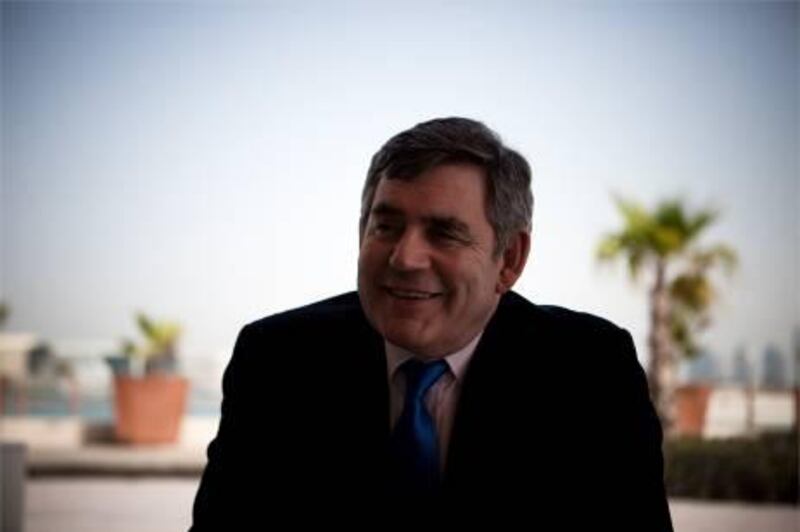ABU DHABI // The former British prime minister Gordon Brown offered some free time to the capital’s brightest young minds yesterday, with a tip of his hat to the UAE’s investment in the UK during tough times and some opinions on the value of education in the face of the region’s political crises.
Mr Brown met with students to answer questions on his time as prime minister and lessons learnt from the recession.
Speaking before a public lecture at New York University’s (NYU) Abu Dhabi campus – his new part-time employer – the former British prime minister and chancellor of the exchequer said sovereign wealth fund investment was vital for Gulf economies and the UK, which had benefited from investments in science and technology.
“They are contributing to the development of the science-based economy and will make a difference not just to Britain but to the investing companies themselves,” he said.
A former protectorate, the UAE’s ties with Britain go back centuries, and Mr Brown said that kind of reciprocal investment and shared history was key to their ongoing relationship.
In 2008, when the UK was in the depths of financial crisis, Sheikh Mansour bin Zayed, the Minister of Presidential Affairs and owner of Manchester City Football Club, was one of three Gulf investors to bail out Barclays bank, while Qatar has invested heavily in assets including Canary Wharf, and recently announced an interest in Lloyds bank and Royal Bank of Scotland.
Mr Brown said the troubles being witnessed around the region highlighted the need for universal access to education, something he would continue to work on beyond his premiership.
Egypt’s problems were rooted in its young, unemployed population, he said. “Two thirds of Egypt’s population are under 30, and 90 per cent of the unemployed are under 30,” he said.
“There will have to be political, as well as economic, solutions to these problems.”
Mr Brown, who served for three years as prime minister and is still a member of parliament, came to NYU as its first “distinguished global leader in residence”, a role that will see him spend two weeks a year in New York and one in Abu Dhabi.
He said the UAE’s development would depend on its continuing commitment to education. “The future lies, even for the richest oil countries in the world, in the potential of the people, in creativity and ingenuity and ideas.
“The future industries of the world will be built around this, so education is essential to everything an economy can achieve in the future.”
Mr Brown said Abu Dhabi was thinking beyond oil into which industries and sectors it could succeed at in the future. “Knowledge industries and the knowledge economy is the future.”
Officials at the university say he is not being paid for his new role, and Mr Brown said he was involved because it is a role model for future “global network universities”. Even the UK – where the oldest university, Oxford, dates back to the 13th century – could learn lessons from the NYU model, which has expanded its reach to Abu Dhabi, he said.
“We’ve got to create universities that co-operate across frontiers,” he said. “The best universities are going to be those which are rooted across many continents, not just one.
“Universities in the UK will be looking at what’s happening here and learning from it, from the initiatives being taken by NYU.”
Layla al Neyadi, a 20-year-old Emirati social research and public policy student, said having access to such major players in global politics was relevant to all the students, no matter what their major. “We always talk about these people and the roles they’ve played, so to meet them and gain their knowledge and share perspectives is an amazing insight for us all.”
She said his speech emphasised countries’ need to co-operate to make the global economy work.
James Lloyd, a British student, said: “In the UK, his reputation isn’t so good, and I think since coming here and getting a more international perspective, I realised how much people truly respect him in terms of his role in solving the financial crisis.”
Gordon Brown's political career:
1983 Elected as Labour MP for Dunfermline East, Scotland.
1985 Joins opposition front bench.
1992 Becomes shadow chancellor.
1997 Becomes chancellor of the exchequer after Labour Party wins power.
2007 Takes over as prime minister but quickly loses popularity after hesitating over whether to call a snap election.
2009 Labour comes third in European elections with just 16 per cent of the vote.
2010 Labour loses general election. Mr Brown resigns as prime minister and party leader.
mswan@thenational.ae






